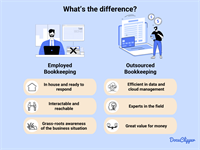The Importance of Hiring a Bookkeeper vs. Having an In-House Bookkeeper
When it comes to managing your business finances, accurate bookkeeping is non-negotiable. Whether you're a solopreneur, a small business owner, or running a growing enterprise, how you manage your financial records can directly impact everything from cash flow to tax compliance to strategic decision-making.
One of the most critical decisions you’ll face in this area is whether to hire a bookkeeper (outsourced) or maintain an in-house bookkeeper. Both options have their merits, but depending on your business size, goals, and complexity, one may prove to be more beneficial than the other.
What Does a Bookkeeper Do?
Before diving into the comparison, it's important to understand what a bookkeeper does:
-
Recording financial transactions
-
Managing accounts receivable and accounts payable
-
Reconciling bank statements
-
Preparing financial reports
-
Supporting tax preparation
-
Ensuring compliance with financial regulations
While not to be confused with accountants (who focus more on financial strategy, tax filing, and auditing), bookkeepers form the backbone of a healthy financial system.
Option 1: In-House Bookkeeper
Advantages:
-
Immediate Availability:
An in-house bookkeeper is present during business hours and can quickly respond to real-time financial queries or tasks. -
Familiarity with Your Business:
Being immersed in your company culture and operations, they may understand your workflows and cash flow patterns better. -
Full Control:
You can oversee their daily work and integrate them into other departments, allowing for tailored processes.
Disadvantages:
-
Higher Costs:
Hiring a full-time employee involves not just a salary but also benefits, payroll taxes, office space, equipment, and training. -
Limited Flexibility:
If your bookkeeping needs are seasonal or fluctuating, paying a full-time salary year-round can be inefficient. -
Risk of Turnover:
If your bookkeeper leaves, you may be left scrambling to reconstruct or understand your records, especially if documentation wasn’t thorough. -
Skill Limitations:
A single in-house bookkeeper may not have expertise in all areas—especially in industries with unique compliance or reporting requirements.
Option 2: Hiring a Bookkeeper (Outsourced)
Advantages:
-
Cost-Effective:
Outsourcing typically allows you to pay only for what you need—whether that’s a few hours a week or full-scale monthly services—without the overhead of a full-time hire. -
Access to Expertise:
Reputable bookkeeping firms or freelance professionals often bring deep experience across industries, as well as updated knowledge on compliance and software. -
Scalability:
As your business grows, an outsourced bookkeeper can easily scale with you by allocating more resources or advanced services. -
Reduced Risk:
Outsourced bookkeepers usually have systems for backups, continuity, and quality control, reducing the risk of errors or loss of information. -
Focus on Core Business:
Delegating financial recordkeeping allows you and your team to concentrate on core activities that drive growth and revenue.
Disadvantages:
-
Less Direct Oversight:
You won’t have physical access to the bookkeeper, which can be a challenge for business owners who want real-time updates or close collaboration. -
Potential Communication Delays:
Depending on the provider, time zone differences or communication styles may cause delays in receiving updates or reports. -
Security Concerns:
While reputable providers use secure systems, sharing sensitive financial data always comes with inherent risks if not managed properly.
Which Option Is Best for Your Business?
Outsource a Bookkeeper If:
-
You have a small to medium-sized business.
-
Your bookkeeping needs are limited or fluctuate.
-
You want to reduce overhead costs.
-
You prefer to pay for services on-demand.
-
You value expertise and scalability.
Hire an In-House Bookkeeper If:
-
You have complex or high-volume financial operations.
-
You need daily, real-time financial insights.
-
Your business requires tight internal financial control.
-
You can afford the cost of a full-time employee with benefits.
Final Thoughts
Bookkeeping is too critical to overlook or mishandle. Whether you choose to outsource or hire internally, the key is to ensure that whoever manages your books does so with accuracy, reliability, and strategic insight. For many modern businesses—especially those in early growth stages or operating lean—outsourcing a bookkeeper provides the flexibility, affordability, and expertise needed to maintain clean financial records without the burden of managing another full-time employee.
However, for more established operations with complex needs, an in-house bookkeeper can offer proximity, control, and immediate responsiveness that supports more dynamic decision-making.
In the end, the right choice aligns with your business structure, financial goals, and available resources.
If you’d like help assessing your specific situation or finding a reputable outsourced bookkeeper, I can help with that too.


